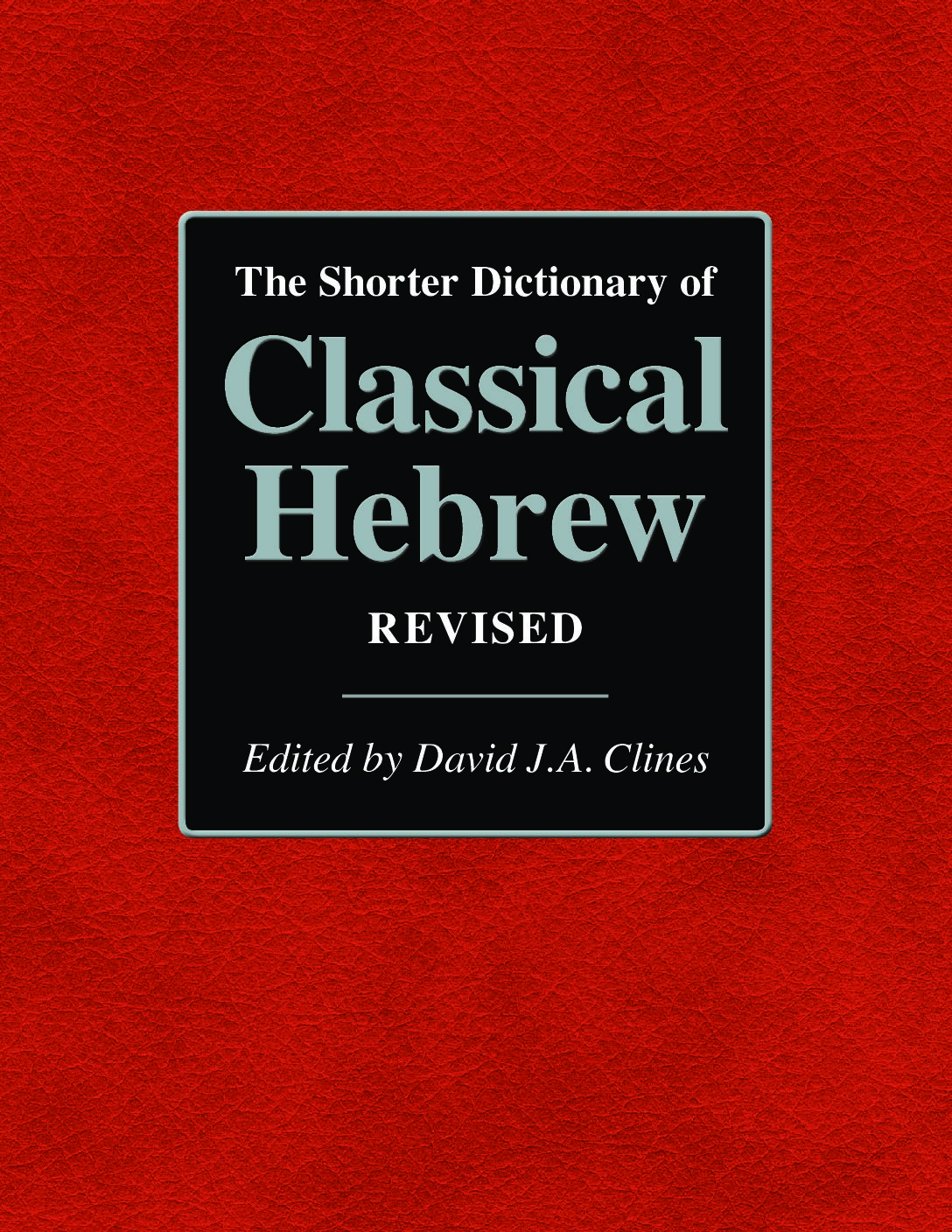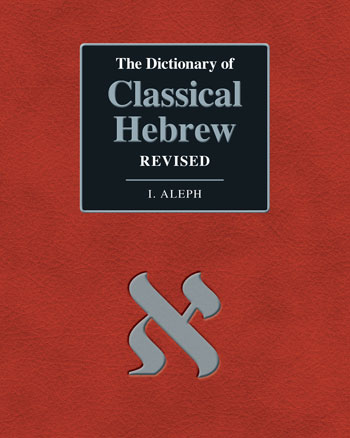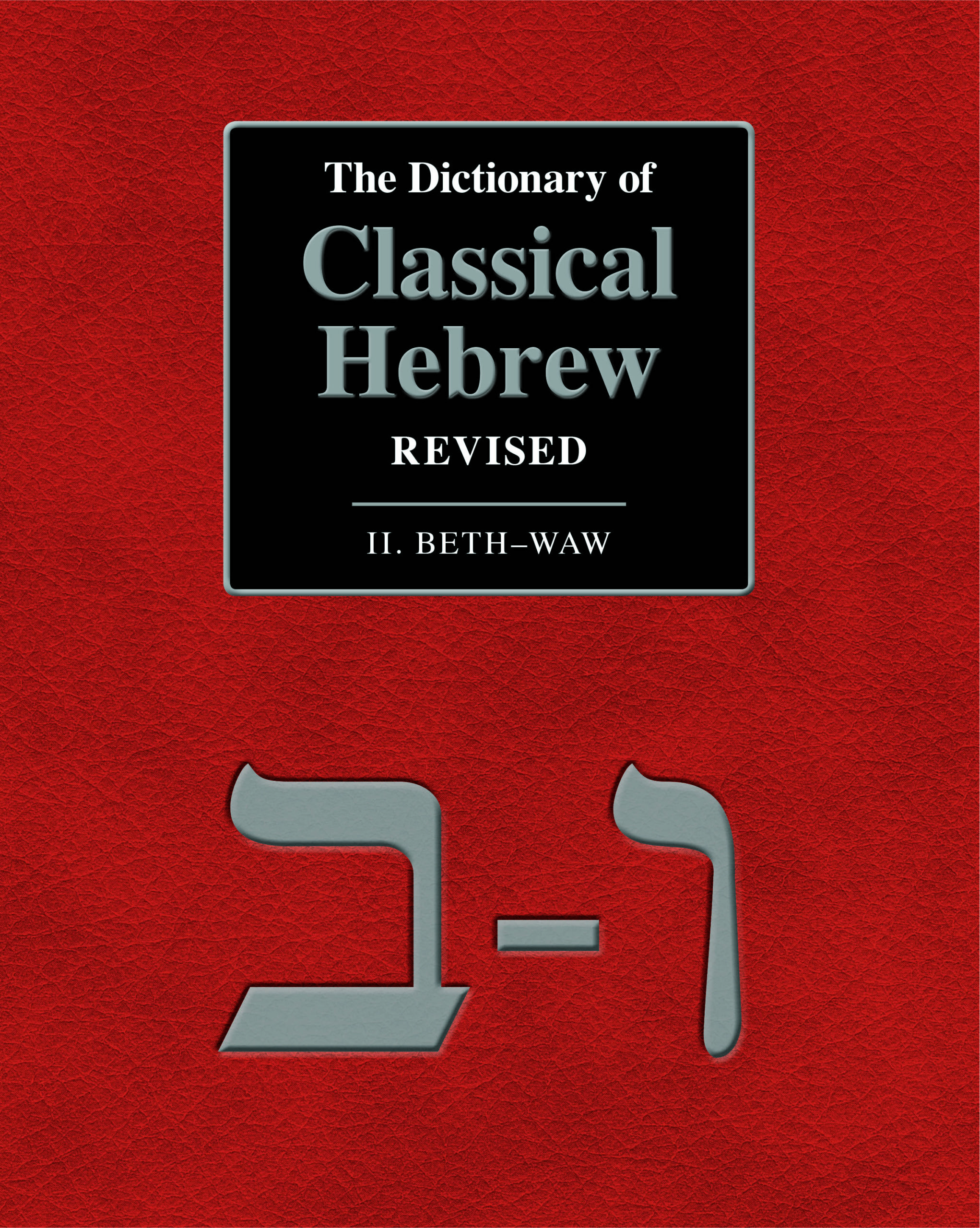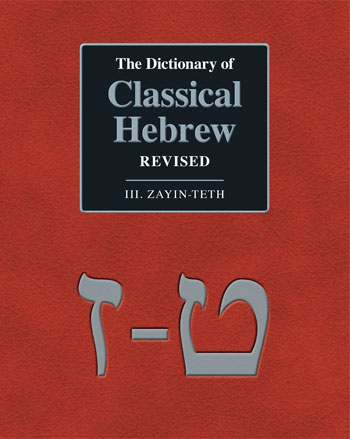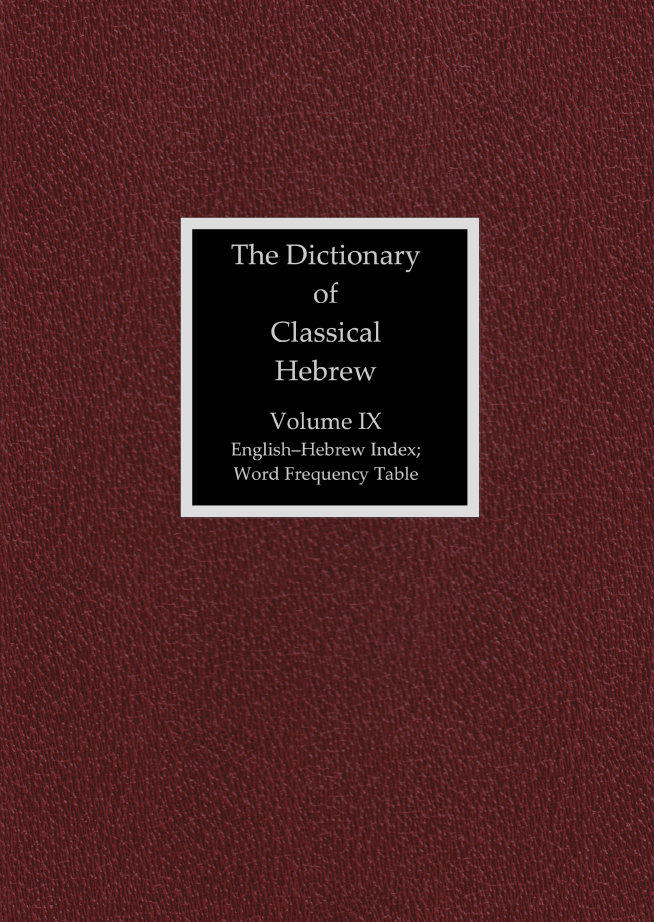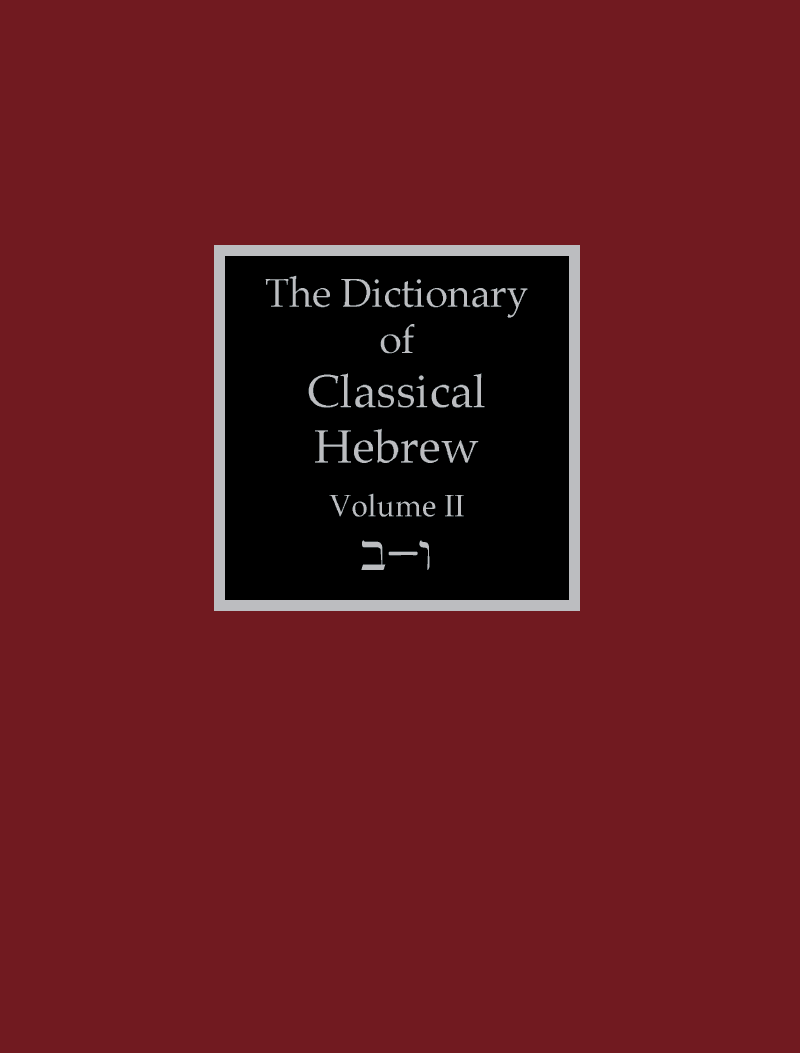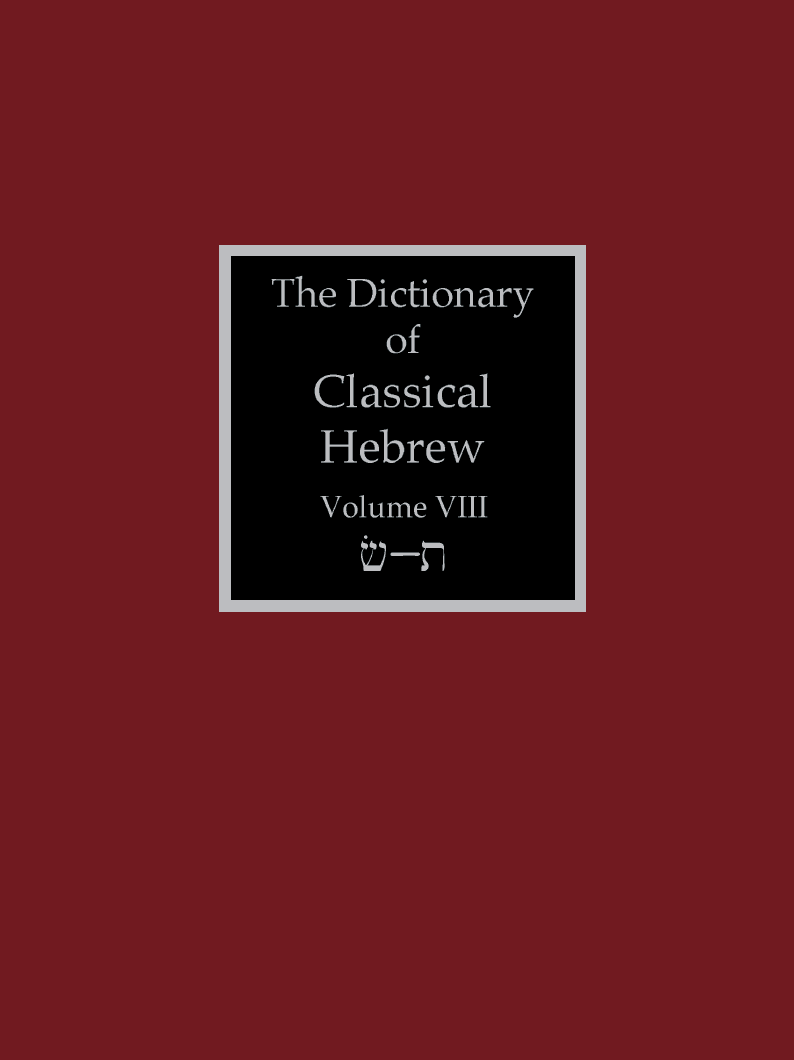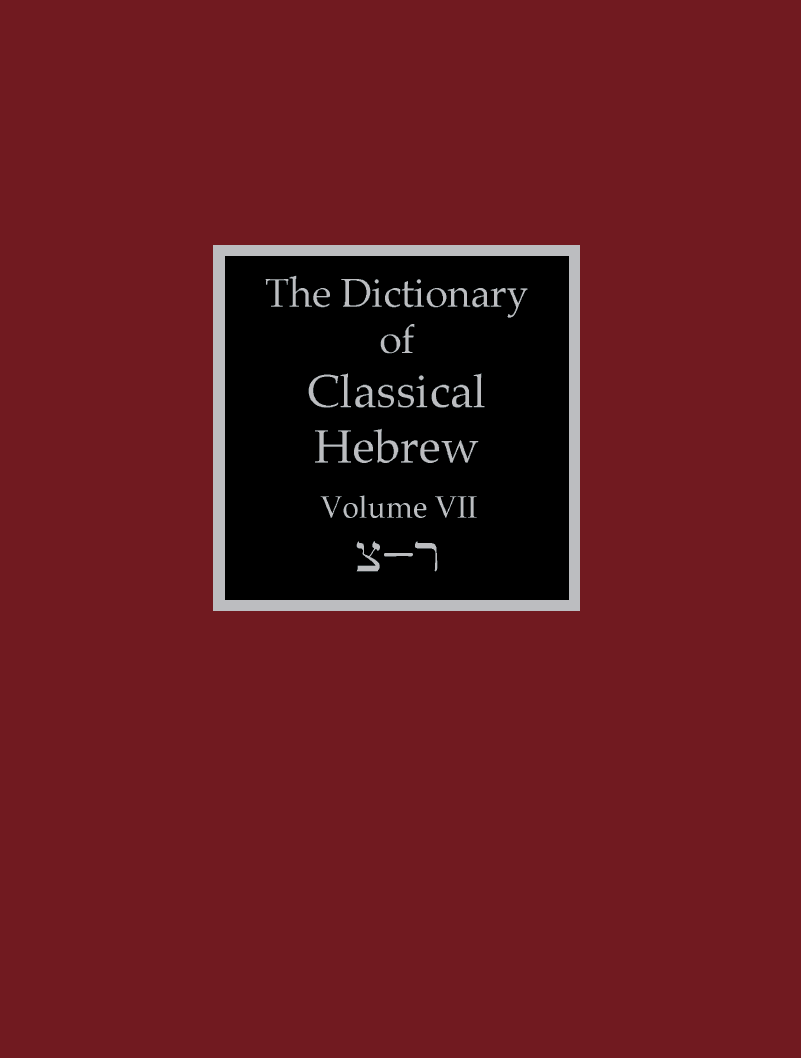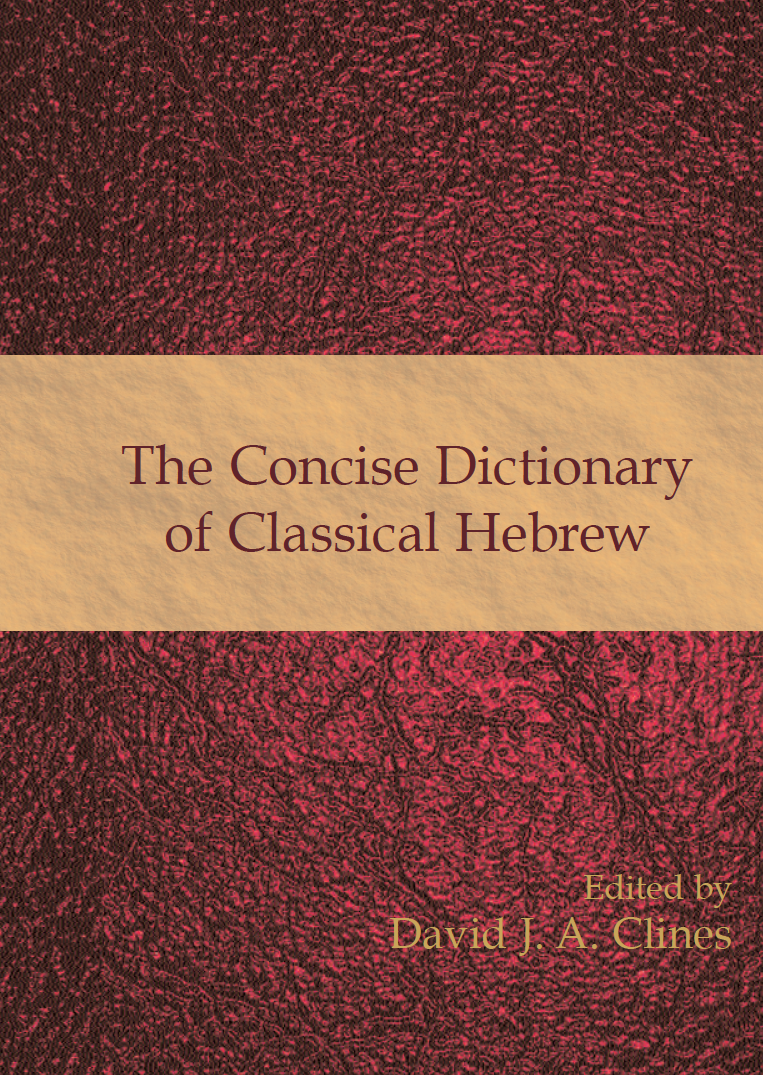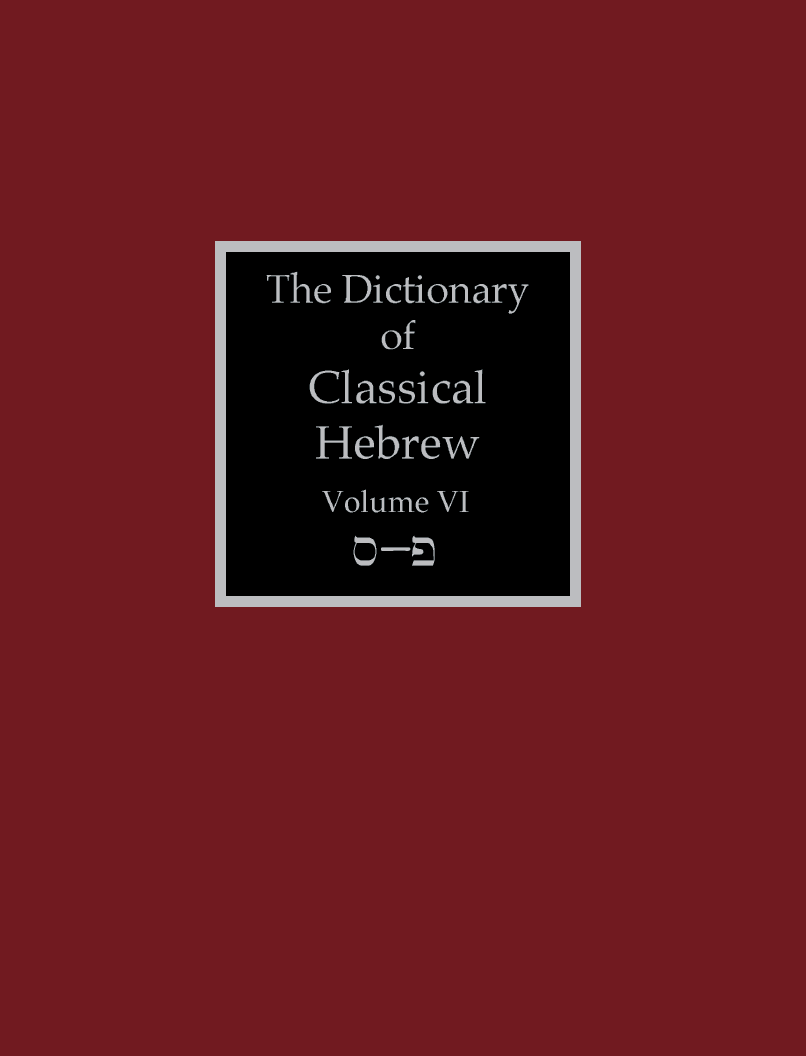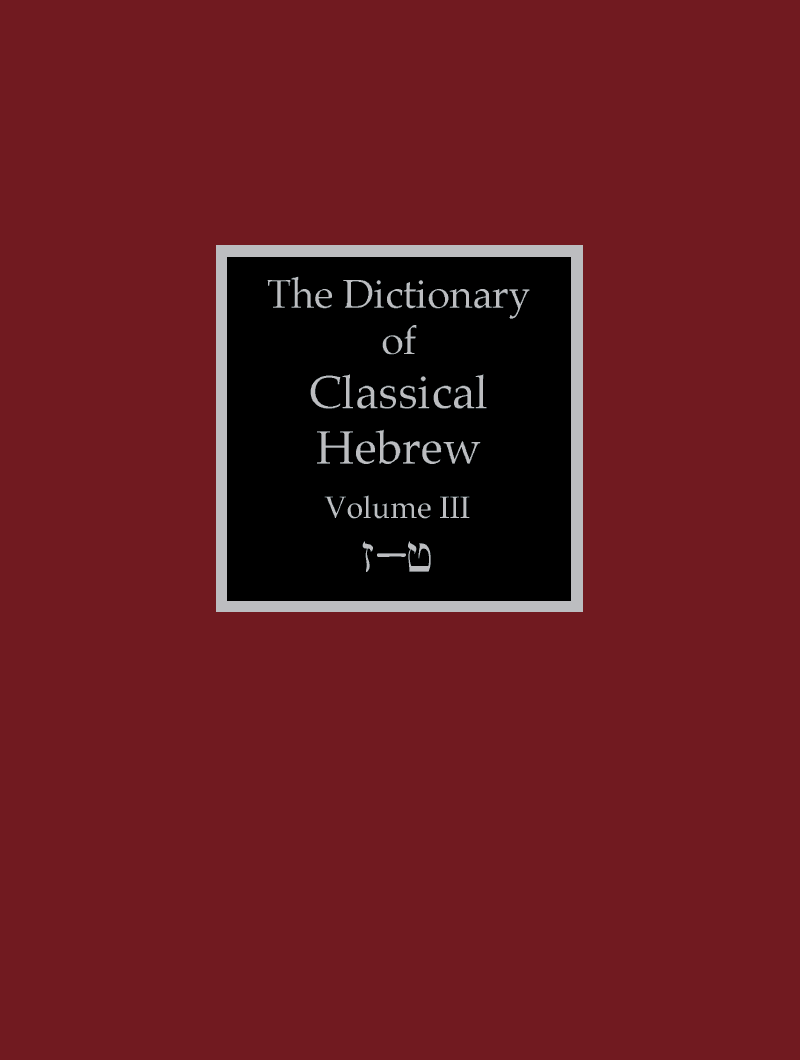The Dictionary of Classical Hebrew Revised. IV. Yodh–Lamedh.
Published: Nov 2025
£150.00
The Dictionary of Classical Hebrew Revised (DCHR) (2018–2028) is a complete revision in nine volumes, with over 100,000 improvements, of the original Dictionary of Classical Hebrew (DCH) (1993–2016). When completed, DCHR will be 5 million words in length (equivalent to 50 standard-size books), 25% longer than DCH, and 4 times the length of BDB and HALOT.
The fourth Volume of The Dictionary of Classical Hebrew Revised, Yodh–Lamedh, arrives 27 years after the publication of the corresponding volume in the first edition (DCH) in 1998. It has taken 2 years particularly because of the publication of The Shorter Dictionary of Classical Hebrew Revised (SDCHR) in 2025, which was always planned by David J.A. Clines (1938–2022) to appear in print before all nine volumes were produced, so that scholars might have access to the most essential elements of DCHR as soon as possible.
The present volume, DCHR IV, contains some 1557 words (lemmas), of which 573 are ‘new words’ (i.e. not in BDB); DCHR IV thus adds c. 60.4% to the number of words for Yodh–Lamedh that are to be found in BDB and other Hebrew dictionaries. DCHR IV also has some 40% more material than DCH IV, which consists of many thousands of additions and corrections, references to the multitude of Dead Sea Scrolls texts and inscriptions published since 1998, and a much expanded Bibliography. It is anticipated that the subsequent volumes of DCHR will be published at a somewhat swifter pace, with Volumes V to IX arriving by 2028, as well as The Concise Dictionary of Classical Hebrew Revised in 2026.
Volumes IV to IX were all planned by David J.A. Clines in his editorial role for DCHR together with David M. Stec as the Research Associate of the project. Now the work of collating the present and forthcoming volumes sits entirely with David Stec.
DCHR as a whole makes approximately 100,000 improvements to DCH, it is about 25% longer than DCH, and has about 2,700 more ‘new words’ (i.e. words not in BDB) than were in DCH. The distinctive features of DCHR as compared with DCH, most notably its indication of byforms, synonyms, verbal nouns, denominative verbs, loanwords and semantic fields, have already been introduced in the preceding volumes of DCHR.
DCHR, when completed, will contain more than 6,420 Hebrew words not in BDB, and will refer to many newly published texts, including 540 Dead Sea Scrolls and 4,000 ancient Hebrew inscriptions. New features in DCHR include: a notation of 4,285 byforms (words with the same meaning and similar form) identified for the first time; 717 verbal nouns (nouns derived from a verb) with their own articles (not previously shown in Hebrew lexica), 345 denominative verbs (verbs derived from a noun), and the semantic field to which every word belongs (a totally new feature for Hebrew dictionaries).
This is the first volume of DCHR to make use of the final version of the sets of synonyms, which was first published in full in SDCHR. The compilation of the sets of synonyms was an ongoing process, which began with work on the first volume of DCHR and was brought to completion only with the production of SDCHR.
Articles on personal names show (for the first time) all short forms, long forms, and alternative forms of each name, the Bibliography has been updated and expanded. Every occurrence of each word in Classical Hebrew is noted. All the subjects and objects of verbs are listed, and the verbs used with each noun, as well as all nouns used in a construct (genitive) relation with another noun. As with DCH, every Hebrew word in the revised Dictionary (except for the variant forms of a word, the byforms and the sections on synonyms) is followed immediately by an English translation, so that the Dictionary can be easily understood by a person with little or no Hebrew.
There is a special discount price for customers subscribing to the DCHR set, and an easy payment plan (details from phoenix.bibs@sheffield.ac.uk).
The Dictionary of Classical Hebrew Revised. IV. Yodh–Lamedh.
£150.00
The Dictionary of Classical Hebrew Revised (DCHR) (2018–2028) is a complete revision in nine volumes, with over 100,000 improvements, of the original Dictionary of Classical Hebrew (DCH) (1993–2016). When completed, DCHR will be 5 million words in length (equivalent to 50 standard-size books), 25% longer than DCH, and 4 times the length of BDB and HALOT.
The fourth Volume of The Dictionary of Classical Hebrew Revised, Yodh–Lamedh, arrives 27 years after the publication of the corresponding volume in the first edition (DCH) in 1998. It has taken 2 years particularly because of the publication of The Shorter Dictionary of Classical Hebrew Revised (SDCHR) in 2025, which was always planned by David J.A. Clines (1938–2022) to appear in print before all nine volumes were produced, so that scholars might have access to the most essential elements of DCHR as soon as possible.
The present volume, DCHR IV, contains some 1557 words (lemmas), of which 573 are ‘new words’ (i.e. not in BDB); DCHR IV thus adds c. 60.4% to the number of words for Yodh–Lamedh that are to be found in BDB and other Hebrew dictionaries. DCHR IV also has some 40% more material than DCH IV, which consists of many thousands of additions and corrections, references to the multitude of Dead Sea Scrolls texts and inscriptions published since 1998, and a much expanded Bibliography. It is anticipated that the subsequent volumes of DCHR will be published at a somewhat swifter pace, with Volumes V to IX arriving by 2028, as well as The Concise Dictionary of Classical Hebrew Revised in 2026.
Volumes IV to IX were all planned by David J.A. Clines in his editorial role for DCHR together with David M. Stec as the Research Associate of the project. Now the work of collating the present and forthcoming volumes sits entirely with David Stec.
DCHR as a whole makes approximately 100,000 improvements to DCH, it is about 25% longer than DCH, and has about 2,700 more ‘new words’ (i.e. words not in BDB) than were in DCH. The distinctive features of DCHR as compared with DCH, most notably its indication of byforms, synonyms, verbal nouns, denominative verbs, loanwords and semantic fields, have already been introduced in the preceding volumes of DCHR.
DCHR, when completed, will contain more than 6,420 Hebrew words not in BDB, and will refer to many newly published texts, including 540 Dead Sea Scrolls and 4,000 ancient Hebrew inscriptions. New features in DCHR include: a notation of 4,285 byforms (words with the same meaning and similar form) identified for the first time; 717 verbal nouns (nouns derived from a verb) with their own articles (not previously shown in Hebrew lexica), 345 denominative verbs (verbs derived from a noun), and the semantic field to which every word belongs (a totally new feature for Hebrew dictionaries).
This is the first volume of DCHR to make use of the final version of the sets of synonyms, which was first published in full in SDCHR. The compilation of the sets of synonyms was an ongoing process, which began with work on the first volume of DCHR and was brought to completion only with the production of SDCHR.
Articles on personal names show (for the first time) all short forms, long forms, and alternative forms of each name, the Bibliography has been updated and expanded. Every occurrence of each word in Classical Hebrew is noted. All the subjects and objects of verbs are listed, and the verbs used with each noun, as well as all nouns used in a construct (genitive) relation with another noun. As with DCH, every Hebrew word in the revised Dictionary (except for the variant forms of a word, the byforms and the sections on synonyms) is followed immediately by an English translation, so that the Dictionary can be easily understood by a person with little or no Hebrew.
There is a special discount price for customers subscribing to the DCHR set, and an easy payment plan (details from phoenix.bibs@sheffield.ac.uk).
The Shorter Dictionary of Classical Hebrew Revised
Published: Mar 2025
£250.00
The Shorter Dictionary of Classical Hebrew Revised (2025) is a single volume desk dictionary abridgement of The Dictionary of Classical Hebrew Revised (DCHR) (2018–2028). The Shorter Dictionary is over 825,000 words in length, placing into a single volume 1/6th of the material of the complete DCHR (over 5 million words), and is designed to be a replacement for BDB (the standard 1906 English lexicon of Hebrew).
The Shorter Dictionary contains more than 6,420 Hebrew words not in BDB, and refers to many newly published texts, including 540 Dead Sea Scrolls and 4,000 ancient Hebrew inscriptions, making it the most thorough Hebrew dictionary ever produced.
Every Hebrew word in The Shorter Dictionary is followed immediately by an English translation (except for the variant forms of a word and the byforms), so that The Shorter Dictionary can be easily understood by a person with little or no Hebrew.
Further features of the dictionary include:
–Scope—The Shorter Dictionary includes not only Biblical Hebrew but also all Classical Hebrew (pre-200 ce), i .e . Ben Sira, Dead Sea Scrolls, inscriptions.
–Syntagmatic analysis—shows examples of subjects and objects of verbs, those of which a noun is subject or object, etc.
–Occurrence statistics—for each word in the four corpora of Classical Hebrew: Hebrew Bible, Ben Sira, Dead Sea Scrolls, Inscriptions—and for each voice (binyan) of a verb.
–Parallels and oppositions. Shows all words used in parallel or opposition in texts.
–A notation of: 4,285 byforms (words with the same meaning and similar form) identified for the first time; 717 verbal nouns (nouns derived from a verb) -with their own articles (not previously shown in Hebrew lexica); 345 denominative verbs (verbs derived from a noun); and the semantic field to which every word belongs (a totally new feature for Hebrew dictionaries).
–An abbreviated version of DCHR’s extensive bibliographies is provided in The Shorter Dictionary.
Not only is The Shorter Dictionary three times longer than The Concise Dictionary of Classical Hebrew (2009)—also The Concise Dictionary is an abbreviation of the original Dictionary of Classical Hebrew (1993–2016), whereas The Shorter Dictionary of Classical Hebrew Revised contains the improved and expanded approach of DCHR (2018–2028).
The Shorter Dictionary (2025) has always planned to be released during the longer period of publication for the 9 volumes of DCHR. From 2019 to 2022 David J.A. Clines, prior to his final illnesses and death:
–completed every necessary editorial task for the future volumes;
–oversaw the preparation of and collation of most materials;
–and provided the means by which the project Research Associate, David Stec, could collate The Shorter Dictionary as well as bring the remaining DCHR volumes to publication.
List price: £250 / $400 / €300
Scholars' price: £125 / $200 / €150 (use code 'scholar' at checkout)
DCHR 1–9 Subscribers' price: £100 / $160 / €120 (email: phoenix.bibs@sheffield.ac.uk for further information)
The Shorter Dictionary of Classical Hebrew Revised
£250.00
The Shorter Dictionary of Classical Hebrew Revised (2025) is a single volume desk dictionary abridgement of The Dictionary of Classical Hebrew Revised (DCHR) (2018–2028). The Shorter Dictionary is over 825,000 words in length, placing into a single volume 1/6th of the material of the complete DCHR (over 5 million words), and is designed to be a replacement for BDB (the standard 1906 English lexicon of Hebrew).
The Shorter Dictionary contains more than 6,420 Hebrew words not in BDB, and refers to many newly published texts, including 540 Dead Sea Scrolls and 4,000 ancient Hebrew inscriptions, making it the most thorough Hebrew dictionary ever produced.
Every Hebrew word in The Shorter Dictionary is followed immediately by an English translation (except for the variant forms of a word and the byforms), so that The Shorter Dictionary can be easily understood by a person with little or no Hebrew.
Further features of the dictionary include:
–Scope—The Shorter Dictionary includes not only Biblical Hebrew but also all Classical Hebrew (pre-200 ce), i .e . Ben Sira, Dead Sea Scrolls, inscriptions.
–Syntagmatic analysis—shows examples of subjects and objects of verbs, those of which a noun is subject or object, etc.
–Occurrence statistics—for each word in the four corpora of Classical Hebrew: Hebrew Bible, Ben Sira, Dead Sea Scrolls, Inscriptions—and for each voice (binyan) of a verb.
–Parallels and oppositions. Shows all words used in parallel or opposition in texts.
–A notation of: 4,285 byforms (words with the same meaning and similar form) identified for the first time; 717 verbal nouns (nouns derived from a verb) -with their own articles (not previously shown in Hebrew lexica); 345 denominative verbs (verbs derived from a noun); and the semantic field to which every word belongs (a totally new feature for Hebrew dictionaries).
–An abbreviated version of DCHR’s extensive bibliographies is provided in The Shorter Dictionary.
Not only is The Shorter Dictionary three times longer than The Concise Dictionary of Classical Hebrew (2009)—also The Concise Dictionary is an abbreviation of the original Dictionary of Classical Hebrew (1993–2016), whereas The Shorter Dictionary of Classical Hebrew Revised contains the improved and expanded approach of DCHR (2018–2028).
The Shorter Dictionary (2025) has always planned to be released during the longer period of publication for the 9 volumes of DCHR. From 2019 to 2022 David J.A. Clines, prior to his final illnesses and death:
–completed every necessary editorial task for the future volumes;
–oversaw the preparation of and collation of most materials;
–and provided the means by which the project Research Associate, David Stec, could collate The Shorter Dictionary as well as bring the remaining DCHR volumes to publication.
List price: £250 / $400 / €300
Scholars' price: £125 / $200 / €150 (use code 'scholar' at checkout)
DCHR 1–9 Subscribers' price: £100 / $160 / €120 (email: phoenix.bibs@sheffield.ac.uk for further information)
The Dictionary of Classical Hebrew, Revised
Published: Nov 2023
Price range: £150.00 through £250.00
The Dictionary of Classical Hebrew Revised (DCHR) is a complete revision, with over 100,000 improvements, of the original Dictionary of Classical Hebrew (1993 —2016).
It contains 6,300 Hebrew words not in the standard lexicon of BDB, and refers to many newly published texts, including 540 Dead Sea Scrolls and 4,000 ancient Hebrew inscriptions. New features include: a notation of 3,700 byforms (words with the same meaning and similar form) identified for the first time; 700 verbal nouns (nouns derived from a verb) with their own articles (not previously shown in Hebrew lexica), 330 denominative verbs (verbs derived from a noun), and the semantic field to which every word belongs (a totally new feature for Hebrew dictionaries).
Data on synonyms have been greatly expanded, and loanwords from other languages included. Articles on personal names show (for the first time) all short forms, long forms, and alternative forms of the name, bibliographies have been updated and expanded, and 35,000 emendations of biblical texts noted. Every occurrence of each word in Classical Hebrew is noted.
All the subjects and objects of verbs are listed, and the verbs used with each noun, as well as all nouns used in a construct (genitive) relation with another noun. As with DCH, every Hebrew word in the Dictionary (except for the sections on synonyms) is followed immediately by an English translation, so that the Dictionary can be easily understood by a person with little or no Hebrew. When completed, DCHR will be 5 million words in length (equivalent to 50 standard-size books), 25% longer than DCH, and 4 times the length of BDB and HALOT.
There is a special discount price for customers subscribing to the DCHR set, and an easy payment plan (details from phoenix.bibs@sheffield.ac.uk).
The Dictionary of Classical Hebrew, Revised
Price range: £150.00 through £250.00
The Dictionary of Classical Hebrew Revised (DCHR) is a complete revision, with over 100,000 improvements, of the original Dictionary of Classical Hebrew (1993 —2016).
It contains 6,300 Hebrew words not in the standard lexicon of BDB, and refers to many newly published texts, including 540 Dead Sea Scrolls and 4,000 ancient Hebrew inscriptions. New features include: a notation of 3,700 byforms (words with the same meaning and similar form) identified for the first time; 700 verbal nouns (nouns derived from a verb) with their own articles (not previously shown in Hebrew lexica), 330 denominative verbs (verbs derived from a noun), and the semantic field to which every word belongs (a totally new feature for Hebrew dictionaries).
Data on synonyms have been greatly expanded, and loanwords from other languages included. Articles on personal names show (for the first time) all short forms, long forms, and alternative forms of the name, bibliographies have been updated and expanded, and 35,000 emendations of biblical texts noted. Every occurrence of each word in Classical Hebrew is noted.
All the subjects and objects of verbs are listed, and the verbs used with each noun, as well as all nouns used in a construct (genitive) relation with another noun. As with DCH, every Hebrew word in the Dictionary (except for the sections on synonyms) is followed immediately by an English translation, so that the Dictionary can be easily understood by a person with little or no Hebrew. When completed, DCHR will be 5 million words in length (equivalent to 50 standard-size books), 25% longer than DCH, and 4 times the length of BDB and HALOT.
There is a special discount price for customers subscribing to the DCHR set, and an easy payment plan (details from phoenix.bibs@sheffield.ac.uk).
The Dictionary of Classical Hebrew Revised. III. Zayin–Teth.
Published: Nov 2023
£150.00
The Dictionary of Classical Hebrew Revised (DCHR) (2018–2028) is a complete revision in nine volumes, with over 100,000 improvements, of the original Dictionary of Classical Hebrew (DCH) (1993–2016). When completed, DCHR will be 5 million words in length (equivalent to 50 standard-size books), 25% longer than DCH, and 4 times the length of BDB and HALOT.
The third Volume of The Dictionary of Classical Hebrew Revised, Zayin–Teth, arrives 27 years after the publication of the corresponding volume in the first edition (DCH) in 1996. Readers will find in the present volume some 32% more words (lemmas) than in the original 3rd volume, amounting to 40% more material, which consists of many thousands of additions and corrections, references to the multitude of Dead Sea Scrolls texts and inscriptions published since 1996, and a much expanded Bibliography.
The nine volumes of DCHR were originally expected to be published at intervals of approximately one year, after the first volume in August 2018. There was, after the second volume, in 2019, a pause until now. From 2019 to 2022 David J.A. Clines, prior to his final illnesses and death:
-completed every necessary editorial task for the future volumes;
-oversaw the preparation of and collation of most materials;
-and provided the means by which the project Research Associate, David Stec, could bring the remaining volumes to completion between 2023 and 2028.
David Clines wrote the Preface for this volume and David Stec completed all outstanding work including the final collation of the sets of synonyms.
The Dictionary of Classical Hebrew Revised, when completed, will contain more than 6,420 Hebrew words not in BDB, and will refer to many newly published texts, including 540 Dead Sea Scrolls and 4,000 ancient Hebrew inscriptions. New features in DCHR include: a notation of 4,285 byforms (words with the same meaning and similar form) identified for the first time; 717 verbal nouns (nouns derived from a verb) with their own articles (not previously shown in Hebrew lexica), 345 denominative verbs (verbs derived from a noun), and the semantic field to which every word belongs (a totally new feature for Hebrew dictionaries).
Data on synonyms have been greatly expanded, and loanwords from other languages included. Articles on personal names show (for the first time) all short forms, long forms, and alternative forms of each name, the Bibliography has been updated and expanded, and 35,000 emendations of biblical texts noted.
Every occurrence of each word in Classical Hebrew is noted. All the subjects and objects of verbs are listed, and the verbs used with each noun, as well as all nouns used in a construct (genitive) relation with another noun. As with DCH, every Hebrew word in the revised Dictionary (except for the variant forms of a word, the byforms and the sections on synonyms) is followed immediately by an English translation, so that the Dictionary can be easily understood by a person with little or no Hebrew.
Among the resources that have been reviewed for the present volume are:
-philological studies on Hebrew words, such as Aitken on blessing and cursing, Koller on tools, and Peters on cooking;
-handbooks on loanwords from other languages, such as Noonan on non-Semitic words, Mankowski on Akkadian and Muchiki on Egyptian loanwords;
-treatments of realia such as Borowski on agriculture and animals, Musselman on plants and Wiggins on weather;
-collections of inscriptions such as the second volume of Davies on Hebrew inscriptions, Lifschits and Vanderhooft on Yehud stamp impressions and Deutsch on Hebrew bullae and biblical period epigraphy.
The Bibliography itself, with over 4,000 entries, an average of 30 items— merely on words beginning Zayin to Teth—for each of the last 120 years, testifies to the vitality of scholarship on the Classical Hebrew language.
There is a special discount price for customers subscribing to the DCHR set, and an easy payment plan (details from phoenix.bibs@sheffield.ac.uk).
The Dictionary of Classical Hebrew Revised. III. Zayin–Teth.
£150.00
The Dictionary of Classical Hebrew Revised (DCHR) (2018–2028) is a complete revision in nine volumes, with over 100,000 improvements, of the original Dictionary of Classical Hebrew (DCH) (1993–2016). When completed, DCHR will be 5 million words in length (equivalent to 50 standard-size books), 25% longer than DCH, and 4 times the length of BDB and HALOT.
The third Volume of The Dictionary of Classical Hebrew Revised, Zayin–Teth, arrives 27 years after the publication of the corresponding volume in the first edition (DCH) in 1996. Readers will find in the present volume some 32% more words (lemmas) than in the original 3rd volume, amounting to 40% more material, which consists of many thousands of additions and corrections, references to the multitude of Dead Sea Scrolls texts and inscriptions published since 1996, and a much expanded Bibliography.
The nine volumes of DCHR were originally expected to be published at intervals of approximately one year, after the first volume in August 2018. There was, after the second volume, in 2019, a pause until now. From 2019 to 2022 David J.A. Clines, prior to his final illnesses and death:
-completed every necessary editorial task for the future volumes;
-oversaw the preparation of and collation of most materials;
-and provided the means by which the project Research Associate, David Stec, could bring the remaining volumes to completion between 2023 and 2028.
David Clines wrote the Preface for this volume and David Stec completed all outstanding work including the final collation of the sets of synonyms.
The Dictionary of Classical Hebrew Revised, when completed, will contain more than 6,420 Hebrew words not in BDB, and will refer to many newly published texts, including 540 Dead Sea Scrolls and 4,000 ancient Hebrew inscriptions. New features in DCHR include: a notation of 4,285 byforms (words with the same meaning and similar form) identified for the first time; 717 verbal nouns (nouns derived from a verb) with their own articles (not previously shown in Hebrew lexica), 345 denominative verbs (verbs derived from a noun), and the semantic field to which every word belongs (a totally new feature for Hebrew dictionaries).
Data on synonyms have been greatly expanded, and loanwords from other languages included. Articles on personal names show (for the first time) all short forms, long forms, and alternative forms of each name, the Bibliography has been updated and expanded, and 35,000 emendations of biblical texts noted.
Every occurrence of each word in Classical Hebrew is noted. All the subjects and objects of verbs are listed, and the verbs used with each noun, as well as all nouns used in a construct (genitive) relation with another noun. As with DCH, every Hebrew word in the revised Dictionary (except for the variant forms of a word, the byforms and the sections on synonyms) is followed immediately by an English translation, so that the Dictionary can be easily understood by a person with little or no Hebrew.
Among the resources that have been reviewed for the present volume are:
-philological studies on Hebrew words, such as Aitken on blessing and cursing, Koller on tools, and Peters on cooking;
-handbooks on loanwords from other languages, such as Noonan on non-Semitic words, Mankowski on Akkadian and Muchiki on Egyptian loanwords;
-treatments of realia such as Borowski on agriculture and animals, Musselman on plants and Wiggins on weather;
-collections of inscriptions such as the second volume of Davies on Hebrew inscriptions, Lifschits and Vanderhooft on Yehud stamp impressions and Deutsch on Hebrew bullae and biblical period epigraphy.
The Bibliography itself, with over 4,000 entries, an average of 30 items— merely on words beginning Zayin to Teth—for each of the last 120 years, testifies to the vitality of scholarship on the Classical Hebrew language.
There is a special discount price for customers subscribing to the DCHR set, and an easy payment plan (details from phoenix.bibs@sheffield.ac.uk).
The Dictionary of Classical Hebrew
Published: Nov 2019
Price range: £35.00 through £445.00
The Dictionary of Classical Hebrew (published 1993-2016) comprises eight volumes plus a ninth volume containing an English–Hebrew Index and Word Frequency Table.
The Dictionary of Classical Hebrew Revised (DCHR) (2018–2028) is a complete revision, with over 100,000 improvements, of the original Dictionary of Classical Hebrew. Three volumes are currently available.
The Concise Dictionary of Classical Hebrew is a one-volume version of The Dictionary of Classical Hebrew.
The Dictionary of Classical Hebrew
Price range: £35.00 through £445.00
The Dictionary of Classical Hebrew (published 1993-2016) comprises eight volumes plus a ninth volume containing an English–Hebrew Index and Word Frequency Table.
The Dictionary of Classical Hebrew Revised (DCHR) (2018–2028) is a complete revision, with over 100,000 improvements, of the original Dictionary of Classical Hebrew. Three volumes are currently available.
The Concise Dictionary of Classical Hebrew is a one-volume version of The Dictionary of Classical Hebrew.
The Dictionary of Classical Hebrew Revised. II. Beth-Waw
Published: Nov 2019
£150.00
The Dictionary of Classical Hebrew Revised (DCHR) is a complete revision (2018–2028) in nine volumes, with over 100,000 improvements, of the original DCH, i.e. Dictionary of Classical Hebrew (1993–2016). This second Volume contains some 2,071 words (lemmas), of which 838 are 'new words' (i.e. not in the standard lexicon of BDB); DCHR II thus adds c. 60% to the number of words for Beth —Waw that are to be found in other Hebrew dictionaries. This revised volume is 40% longer than DCH II (1995), which it replaces. The Dictionary of Classical Hebrew Revised , when completed, will contain more than 6,420 Hebrew words not in BDB, and will refer to many newly published texts, including 540 Dead Sea Scrolls and 4,000 ancient Hebrew inscriptions. New features in DCHR include: a notation of 4,285 byforms (words with the same meaning and similar form) identified for the first time; 717 verbal nouns (nouns derived from a verb) with their own articles (not previously shown in Hebrew lexica), 345 denominative verbs (verbs derived from a noun), and the semantic field to which every word belongs (a totally new feature for Hebrew dictionaries). Data on synonyms have been greatly expanded, and loanwords from other languages included. Articles on personal names show (for the first time) all short forms, long forms, and alternative forms of each name, the Bibliography has been updated and expanded, and 35,000 emendations of biblical texts noted. Every occurrence of each word in Classical Hebrew is noted. All the subjects and objects of verbs are listed, and the verbs used with each noun, as well as all nouns used in a construct (genitive) relation with another noun. As with DCH , every Hebrew word in the Dictionary (except for the variant forms of a word, the byforms and the sections on synonyms) is followed immediately by an English translation, so that the Dictionary can be easily understood by a person with little or no Hebrew. When completed, DCHR will be 5 million words in length (equivalent to 50 standard-size books), 25% longer than DCH , and 4 times the length of BDB and HALOT . The nine volumes of DCHR are expected to be published at intervals of approximately one year after the first volume in August 2018. There is a special discount price for customers subscribing to the DCHR set, and an easy payment plan (details from phoenix.bibs@sheffield.ac.uk).
The Dictionary of Classical Hebrew Revised. II. Beth-Waw
£150.00
The Dictionary of Classical Hebrew Revised (DCHR) is a complete revision (2018–2028) in nine volumes, with over 100,000 improvements, of the original DCH, i.e. Dictionary of Classical Hebrew (1993–2016). This second Volume contains some 2,071 words (lemmas), of which 838 are 'new words' (i.e. not in the standard lexicon of BDB); DCHR II thus adds c. 60% to the number of words for Beth —Waw that are to be found in other Hebrew dictionaries. This revised volume is 40% longer than DCH II (1995), which it replaces. The Dictionary of Classical Hebrew Revised , when completed, will contain more than 6,420 Hebrew words not in BDB, and will refer to many newly published texts, including 540 Dead Sea Scrolls and 4,000 ancient Hebrew inscriptions. New features in DCHR include: a notation of 4,285 byforms (words with the same meaning and similar form) identified for the first time; 717 verbal nouns (nouns derived from a verb) with their own articles (not previously shown in Hebrew lexica), 345 denominative verbs (verbs derived from a noun), and the semantic field to which every word belongs (a totally new feature for Hebrew dictionaries). Data on synonyms have been greatly expanded, and loanwords from other languages included. Articles on personal names show (for the first time) all short forms, long forms, and alternative forms of each name, the Bibliography has been updated and expanded, and 35,000 emendations of biblical texts noted. Every occurrence of each word in Classical Hebrew is noted. All the subjects and objects of verbs are listed, and the verbs used with each noun, as well as all nouns used in a construct (genitive) relation with another noun. As with DCH , every Hebrew word in the Dictionary (except for the variant forms of a word, the byforms and the sections on synonyms) is followed immediately by an English translation, so that the Dictionary can be easily understood by a person with little or no Hebrew. When completed, DCHR will be 5 million words in length (equivalent to 50 standard-size books), 25% longer than DCH , and 4 times the length of BDB and HALOT . The nine volumes of DCHR are expected to be published at intervals of approximately one year after the first volume in August 2018. There is a special discount price for customers subscribing to the DCHR set, and an easy payment plan (details from phoenix.bibs@sheffield.ac.uk).
The Dictionary of Classical Hebrew. I. Aleph. Revised Edition
Published: July 2018
£150.00
The Dictionary of Classical Hebrew Revised (DCHR ) is a complete revision, with over 100,000 improvements, of the original Dictionary of Classical Hebrew (1993 —2016).
It contains 6,300 Hebrew words not in the standard lexicon of BDB, and refers to many newly published texts, including 540 Dead Sea Scrolls and 4,000 ancient Hebrew inscriptions. New features include: a notation of 3,700 byforms (words with the same meaning and similar form) identified for the first time; 700 verbal nouns (nouns derived from a verb) with their own articles (not previously shown in Hebrew lexica), 330 denominative verbs (verbs derived from a noun), and the semantic field to which every word belongs (a totally new feature for Hebrew dictionaries).
Data on synonyms have been greatly expanded, and loanwords from other languages included. Articles on personal names show (for the first time) all short forms, long forms, and alternative forms of the name, bibliographies have been updated and expanded, and 35,000 emendations of biblical texts noted. Every occurrence of each word in Classical Hebrew is noted.
All the subjects and objects of verbs are listed, and the verbs used with each noun, as well as all nouns used in a construct (genitive) relation with another noun. As with DCH, every Hebrew word in the Dictionary (except for the sections on synonyms) is followed immediately by an English translation, so that the Dictionary can be easily understood by a person with little or no Hebrew. When completed, DCHR will be 5 million words in length (equivalent to 50 standard-size books), 25% longer than DCH, and 4 times the length of BDB and HALOT.
There is a special discount price for customers subscribing to the DCHR set, and an easy payment plan (details from phoenix.bibs@sheffield.ac.uk).
The Dictionary of Classical Hebrew. I. Aleph. Revised Edition
£150.00
The Dictionary of Classical Hebrew Revised (DCHR ) is a complete revision, with over 100,000 improvements, of the original Dictionary of Classical Hebrew (1993 —2016).
It contains 6,300 Hebrew words not in the standard lexicon of BDB, and refers to many newly published texts, including 540 Dead Sea Scrolls and 4,000 ancient Hebrew inscriptions. New features include: a notation of 3,700 byforms (words with the same meaning and similar form) identified for the first time; 700 verbal nouns (nouns derived from a verb) with their own articles (not previously shown in Hebrew lexica), 330 denominative verbs (verbs derived from a noun), and the semantic field to which every word belongs (a totally new feature for Hebrew dictionaries).
Data on synonyms have been greatly expanded, and loanwords from other languages included. Articles on personal names show (for the first time) all short forms, long forms, and alternative forms of the name, bibliographies have been updated and expanded, and 35,000 emendations of biblical texts noted. Every occurrence of each word in Classical Hebrew is noted.
All the subjects and objects of verbs are listed, and the verbs used with each noun, as well as all nouns used in a construct (genitive) relation with another noun. As with DCH, every Hebrew word in the Dictionary (except for the sections on synonyms) is followed immediately by an English translation, so that the Dictionary can be easily understood by a person with little or no Hebrew. When completed, DCHR will be 5 million words in length (equivalent to 50 standard-size books), 25% longer than DCH, and 4 times the length of BDB and HALOT.
There is a special discount price for customers subscribing to the DCHR set, and an easy payment plan (details from phoenix.bibs@sheffield.ac.uk).
The Dictionary of Classical Hebrew, Volumes 1-9 Hardback
Published: Jun 2016
Price range: £50.00 through £150.00
The Dictionary of Classical Hebrew is a completely new and innovative dictionary.
Unlike previous dictionaries, which have been dictionaries of biblical Hebrew, this is the first dictionary of the classical Hebrew language to include the Bible, Dead Sea Scrolls, and all the other known Hebrew inscriptions and manuscripts.
This Dictionary covers the period from the earliest times to 200 CE. It lists and analyses every occurrences of each Hebrew word that occurs in texts of that period, with an English translation of every Hebrew word and phrase cited.
Among its special features are: a list of the non-biblical texts cited (especially the Dead Sea Scrolls), a word frequency index for each letter of the alphabet, a substantial bibliography (from Volume 2 onward) and an English-Hebrew index in each volume.
The Dictionary of Classical Hebrew, Volumes 1-9 Hardback
Price range: £50.00 through £150.00
The Dictionary of Classical Hebrew is a completely new and innovative dictionary.
Unlike previous dictionaries, which have been dictionaries of biblical Hebrew, this is the first dictionary of the classical Hebrew language to include the Bible, Dead Sea Scrolls, and all the other known Hebrew inscriptions and manuscripts.
This Dictionary covers the period from the earliest times to 200 CE. It lists and analyses every occurrences of each Hebrew word that occurs in texts of that period, with an English translation of every Hebrew word and phrase cited.
Among its special features are: a list of the non-biblical texts cited (especially the Dead Sea Scrolls), a word frequency index for each letter of the alphabet, a substantial bibliography (from Volume 2 onward) and an English-Hebrew index in each volume.
The Dictionary of Classical Hebrew, Volume 9: Index
Published: May 2016
Price range: £50.00 through £150.00
Volume IX offers a valuable enhancement of the 8-volume Dictionary of Classical Hebrew (1993 —2011). In DCH I —VIII, each volume had its own English —Hebrew Index, but this volume presents a much improved gathering together of all those indexes. The Index here contains every word used as a translation (gloss) in the Dictionary, that is, all the words printed in bold. In addition —a feature not seen before in Hebrew dictionaries —beneath each listed word are noted all the Hebrew words it translates, together with the volume and page reference of the relevant article.
The Index thus shows at a glance all the Hebrew words that are translated with the same English word, e.g. Arrogance 10 Hebrew words, Arrow 7, Assembly 10, Band 9, Basket 9, Bend 10, Branch 23, Break 21. So it becomes an index of synonyms, hard to parallel elsewhere in the scholarly literature.
Indexes have not been a common feature of twentieth-century Hebrew dictionaries, though they were quite frequent in older lexica, and it is time they were restored as a customary element in a lexicon. Browsing the Index will prove not only interesting but also useful.
The second element in this volume is the Word Frequency Table. This is a combination of the Word Frequency Tables in the various volumes of DCH . There, the lists of word frequencies were arranged under each letter of the alphabet. In the present publication, all the words in the Dictionary are combined in a single list arranged in order of frequency of occurrence.
Unlike all previous lists of occurrences of Hebrew words, the present list includes the occurrences not only in the Hebrew Bible but also in the whole scope of The Dictionary of Classical Hebrew, which is to say, Sirach (Ecclesiasticus), the Dead Sea Scrolls and the Hebrew Inscriptions as well as the Hebrew Bible itself. For each word there is listed the number of occurrences in each of those four corpora, and the ranking position of a given word is determined by the total number of occurrences in all the classical Hebrew texts combined. For some sample pages of this Volume, click The Dictionary of Classical Hebrew, IX . See also The Concise Dictionary of Classical Hebrew, a one-volume version of The Dictionary of Classical Hebrew.
The Dictionary of Classical Hebrew, Volume 9: Index
Price range: £50.00 through £150.00
Volume IX offers a valuable enhancement of the 8-volume Dictionary of Classical Hebrew (1993 —2011). In DCH I —VIII, each volume had its own English —Hebrew Index, but this volume presents a much improved gathering together of all those indexes. The Index here contains every word used as a translation (gloss) in the Dictionary, that is, all the words printed in bold. In addition —a feature not seen before in Hebrew dictionaries —beneath each listed word are noted all the Hebrew words it translates, together with the volume and page reference of the relevant article.
The Index thus shows at a glance all the Hebrew words that are translated with the same English word, e.g. Arrogance 10 Hebrew words, Arrow 7, Assembly 10, Band 9, Basket 9, Bend 10, Branch 23, Break 21. So it becomes an index of synonyms, hard to parallel elsewhere in the scholarly literature.
Indexes have not been a common feature of twentieth-century Hebrew dictionaries, though they were quite frequent in older lexica, and it is time they were restored as a customary element in a lexicon. Browsing the Index will prove not only interesting but also useful.
The second element in this volume is the Word Frequency Table. This is a combination of the Word Frequency Tables in the various volumes of DCH . There, the lists of word frequencies were arranged under each letter of the alphabet. In the present publication, all the words in the Dictionary are combined in a single list arranged in order of frequency of occurrence.
Unlike all previous lists of occurrences of Hebrew words, the present list includes the occurrences not only in the Hebrew Bible but also in the whole scope of The Dictionary of Classical Hebrew, which is to say, Sirach (Ecclesiasticus), the Dead Sea Scrolls and the Hebrew Inscriptions as well as the Hebrew Bible itself. For each word there is listed the number of occurrences in each of those four corpora, and the ranking position of a given word is determined by the total number of occurrences in all the classical Hebrew texts combined. For some sample pages of this Volume, click The Dictionary of Classical Hebrew, IX . See also The Concise Dictionary of Classical Hebrew, a one-volume version of The Dictionary of Classical Hebrew.
The Dictionary of Classical Hebrew, Volume VIII Sin-Taw
Published: Dec 2012
£150.00
The Dictionary of Classical Hebrew is a completely new and innovative dictionary.
Unlike previous dictionaries, which have been dictionaries of biblical Hebrew, this is the first dictionary of the classical Hebrew language to include the Bible, Dead Sea Scrolls, and all the other known Hebrew inscriptions and manuscripts.
This Dictionary covers the period from the earliest times to 200 CE. It lists and analyses every occurrences of each Hebrew word that occurs in texts of that period, with an English translation of every Hebrew word and phrase cited.
Among its special features are: a list of the non-biblical texts cited (especially the Dead Sea Scrolls), a word frequency index for each letter of the alphabet, a substantial bibliography (from Volume 2 onward) and an English–Hebrew index in each volume.
The Dictionary of Classical Hebrew, Volume VIII Sin-Taw
£150.00
The Dictionary of Classical Hebrew is a completely new and innovative dictionary.
Unlike previous dictionaries, which have been dictionaries of biblical Hebrew, this is the first dictionary of the classical Hebrew language to include the Bible, Dead Sea Scrolls, and all the other known Hebrew inscriptions and manuscripts.
This Dictionary covers the period from the earliest times to 200 CE. It lists and analyses every occurrences of each Hebrew word that occurs in texts of that period, with an English translation of every Hebrew word and phrase cited.
Among its special features are: a list of the non-biblical texts cited (especially the Dead Sea Scrolls), a word frequency index for each letter of the alphabet, a substantial bibliography (from Volume 2 onward) and an English–Hebrew index in each volume.
The Dictionary of Classical Hebrew: Volumes 1-9 paperback
Published: Nov 2011
£445.00
The Dictionary of Classical Hebrew is a completely new and innovative dictionary.
Unlike previous dictionaries, which have been dictionaries of biblical Hebrew, this is the first dictionary of the classical Hebrew language to include, as well as the biblical texts, Ben Sira, the Dead Sea Scrolls, and all the other known Hebrew inscriptions and manuscripts.
This Dictionary covers the period from the earliest times to 200 CE. It lists and analyses every occurrence of each Hebrew word that occurs in texts of that period, with an English translation of every Hebrew word and phrase cited. Among its special features are: a list of the non-biblical texts cited (especially the Dead Sea Scrolls), a word frequency index for each letter of the alphabet, a substantial bibliography and an English–Hebrew index in each volume.
The paperback edition contains exactly the same pages as the hardback, and is priced at less than half the hardback price.
Please use this page for ordering the complete set of 9 paperback vols., originally published between 1993 and 2016.
The Dictionary of Classical Hebrew: Volumes 1-9 paperback
£445.00
The Dictionary of Classical Hebrew is a completely new and innovative dictionary.
Unlike previous dictionaries, which have been dictionaries of biblical Hebrew, this is the first dictionary of the classical Hebrew language to include, as well as the biblical texts, Ben Sira, the Dead Sea Scrolls, and all the other known Hebrew inscriptions and manuscripts.
This Dictionary covers the period from the earliest times to 200 CE. It lists and analyses every occurrence of each Hebrew word that occurs in texts of that period, with an English translation of every Hebrew word and phrase cited. Among its special features are: a list of the non-biblical texts cited (especially the Dead Sea Scrolls), a word frequency index for each letter of the alphabet, a substantial bibliography and an English–Hebrew index in each volume.
The paperback edition contains exactly the same pages as the hardback, and is priced at less than half the hardback price.
Please use this page for ordering the complete set of 9 paperback vols., originally published between 1993 and 2016.
The Dictionary of Classical Hebrew, Volume VII Sade—Resh
Published: Nov 2010
£150.00
The Dictionary of Classical Hebrew is a completely new and innovative dictionary.
Unlike previous dictionaries, which have been dictionaries of biblical Hebrew, this is the first dictionary of the classical Hebrew language to include the Bible, Dead Sea Scrolls, and all the other known Hebrew inscriptions and manuscripts.
This Dictionary covers the period from the earliest times to 200 CE. It lists and analyses every occurrences of each Hebrew word that occurs in texts of that period, with an English translation of every Hebrew word and phrase cited.
Among its special features are: a list of the non-biblical texts cited (especially the Dead Sea Scrolls), a word frequency index for each letter of the alphabet, a substantial bibliography (from Volume 2 onward) and an English–Hebrew index in each volume.
The Dictionary of Classical Hebrew, Volume VII Sade—Resh
£150.00
The Dictionary of Classical Hebrew is a completely new and innovative dictionary.
Unlike previous dictionaries, which have been dictionaries of biblical Hebrew, this is the first dictionary of the classical Hebrew language to include the Bible, Dead Sea Scrolls, and all the other known Hebrew inscriptions and manuscripts.
This Dictionary covers the period from the earliest times to 200 CE. It lists and analyses every occurrences of each Hebrew word that occurs in texts of that period, with an English translation of every Hebrew word and phrase cited.
Among its special features are: a list of the non-biblical texts cited (especially the Dead Sea Scrolls), a word frequency index for each letter of the alphabet, a substantial bibliography (from Volume 2 onward) and an English–Hebrew index in each volume.
The Concise Dictionary of Classical Hebrew
Published: Oct 2009
Price range: £35.00 through £60.00
This Dictionary (CDCH) is an abridgment of the 8-volume Dictionary of Classical Hebrew (DCH). The DCH, the first volume of which appeared in 1993, was the first dictionary of the Classical Hebrew language ever to be published. Unlike other dictionaries of the ancient Hebrew language, which cover only the texts of the Hebrew Bible, either exclusively or principally, DCH records the language of all texts written in Hebrew from the earliest times down to the end of the second century CE. That is to say, it includes not only the words used in the Hebrew Bible, but also those found in the Hebrew Book of Ben Sira (Ecclesiasticus), the Dead Sea Scrolls, and all the ancient Hebrew inscriptions.
The CDCH thus contains not only the c. 8400 Hebrew words found in the standard dictionaries, but also a further 3340+ words (540 from the Dead Sea Scrolls, 680 from other ancient Hebrew literature, and 2120+ proposed words for the Hebrew Bible not previously recognized by dictionaries). All the words in the full Dictionary of Classical Hebrew are to be found in the CDCH.
The CDCH has been designed to be clear, concise and easy to use. The Hebrew words are arranged in alphabetical order, so it is not necessary to know the 'root' of a word to look it up in the Dictionary. All the Hebrew words and phrases quoted are accompanied by an English translation. At the end of each entry on verbs is a list of the nouns derived from that verb; and at the end of each entry on nouns a reference to the verb from which it is derived (when known). For every word the numbers of its occurrences in the four main corpora of classical Hebrew (the Bible, the Dead Sea Scrolls, Ben Sira, and the ancient inscriptions) are noted. All the proper names in classical Hebrew texts are included, with their correct spellings in English.
Previous dictionaries have generally been revisions and adaptations of earlier dictionaries; DCH and CDCH result from a completely fresh re-examination of the texts and an independent analysis of the meanings of Hebrew words. Rich in examples and citations, this edition will be of immense value to students at all levels, as well as to working scholars who will not always be in a position to refer to the complete DCH.
The Concise Dictionary of Classical Hebrew
Price range: £35.00 through £60.00
This Dictionary (CDCH) is an abridgment of the 8-volume Dictionary of Classical Hebrew (DCH). The DCH, the first volume of which appeared in 1993, was the first dictionary of the Classical Hebrew language ever to be published. Unlike other dictionaries of the ancient Hebrew language, which cover only the texts of the Hebrew Bible, either exclusively or principally, DCH records the language of all texts written in Hebrew from the earliest times down to the end of the second century CE. That is to say, it includes not only the words used in the Hebrew Bible, but also those found in the Hebrew Book of Ben Sira (Ecclesiasticus), the Dead Sea Scrolls, and all the ancient Hebrew inscriptions.
The CDCH thus contains not only the c. 8400 Hebrew words found in the standard dictionaries, but also a further 3340+ words (540 from the Dead Sea Scrolls, 680 from other ancient Hebrew literature, and 2120+ proposed words for the Hebrew Bible not previously recognized by dictionaries). All the words in the full Dictionary of Classical Hebrew are to be found in the CDCH.
The CDCH has been designed to be clear, concise and easy to use. The Hebrew words are arranged in alphabetical order, so it is not necessary to know the 'root' of a word to look it up in the Dictionary. All the Hebrew words and phrases quoted are accompanied by an English translation. At the end of each entry on verbs is a list of the nouns derived from that verb; and at the end of each entry on nouns a reference to the verb from which it is derived (when known). For every word the numbers of its occurrences in the four main corpora of classical Hebrew (the Bible, the Dead Sea Scrolls, Ben Sira, and the ancient inscriptions) are noted. All the proper names in classical Hebrew texts are included, with their correct spellings in English.
Previous dictionaries have generally been revisions and adaptations of earlier dictionaries; DCH and CDCH result from a completely fresh re-examination of the texts and an independent analysis of the meanings of Hebrew words. Rich in examples and citations, this edition will be of immense value to students at all levels, as well as to working scholars who will not always be in a position to refer to the complete DCH.
The Dictionary of Classical Hebrew, Volume VI Samekh–Pe
Published: Nov 2007
£150.00
The Dictionary of Classical Hebrew is a completely new and innovative dictionary.
Unlike previous dictionaries, which have been dictionaries of biblical Hebrew, this is the first dictionary of the classical Hebrew language to include the Bible, Dead Sea Scrolls, and all the other known Hebrew inscriptions and manuscripts.
This Dictionary covers the period from the earliest times to 200 CE. It lists and analyses every occurrences of each Hebrew word that occurs in texts of that period, with an English translation of every Hebrew word and phrase cited.
Among its special features are: a list of the non-biblical texts cited (especially the Dead Sea Scrolls), a word frequency index for each letter of the alphabet, a substantial bibliography (from Volume 2 onward) and an English–Hebrew index in each volume.
The Dictionary of Classical Hebrew, Volume VI Samekh–Pe
£150.00
The Dictionary of Classical Hebrew is a completely new and innovative dictionary.
Unlike previous dictionaries, which have been dictionaries of biblical Hebrew, this is the first dictionary of the classical Hebrew language to include the Bible, Dead Sea Scrolls, and all the other known Hebrew inscriptions and manuscripts.
This Dictionary covers the period from the earliest times to 200 CE. It lists and analyses every occurrences of each Hebrew word that occurs in texts of that period, with an English translation of every Hebrew word and phrase cited.
Among its special features are: a list of the non-biblical texts cited (especially the Dead Sea Scrolls), a word frequency index for each letter of the alphabet, a substantial bibliography (from Volume 2 onward) and an English–Hebrew index in each volume.
The Dictionary of Classical Hebrew, Volume V Mem–Nun
Published: Aug 2001
£150.00
The Dictionary of Classical Hebrew is a completely new and innovative dictionary.
Unlike previous dictionaries, which have been dictionaries of biblical Hebrew, this is the first dictionary of the classical Hebrew language to include the Bible, Dead Sea Scrolls, and all the other known Hebrew inscriptions and manuscripts.
This Dictionary covers the period from the earliest times to 200 CE. It lists and analyses every occurrences of each Hebrew word that occurs in texts of that period, with an English translation of every Hebrew word and phrase cited.
Among its special features are: a list of the non-biblical texts cited (especially the Dead Sea Scrolls), a word frequency index for each letter of the alphabet, a substantial bibliography (from Volume 2 onward) and an English–Hebrew index in each volume.
The Dictionary of Classical Hebrew, Volume V Mem–Nun
£150.00
The Dictionary of Classical Hebrew is a completely new and innovative dictionary.
Unlike previous dictionaries, which have been dictionaries of biblical Hebrew, this is the first dictionary of the classical Hebrew language to include the Bible, Dead Sea Scrolls, and all the other known Hebrew inscriptions and manuscripts.
This Dictionary covers the period from the earliest times to 200 CE. It lists and analyses every occurrences of each Hebrew word that occurs in texts of that period, with an English translation of every Hebrew word and phrase cited.
Among its special features are: a list of the non-biblical texts cited (especially the Dead Sea Scrolls), a word frequency index for each letter of the alphabet, a substantial bibliography (from Volume 2 onward) and an English–Hebrew index in each volume.
The Dictionary of Classical Hebrew, Volume IV Yodh–Lamedh
Published: Aug 1998
£150.00
The Dictionary of Classical Hebrew is a completely new and innovative dictionary.
Unlike previous dictionaries, which have been dictionaries of biblical Hebrew, this is the first dictionary of the classical Hebrew language to include the Bible, Dead Sea Scrolls, and all the other known Hebrew inscriptions and manuscripts.
This Dictionary covers the period from the earliest times to 200 CE. It lists and analyses every occurrences of each Hebrew word that occurs in texts of that period, with an English translation of every Hebrew word and phrase cited.
Among its special features are: a list of the non-biblical texts cited (especially the Dead Sea Scrolls), a word frequency index for each letter of the alphabet, a substantial bibliography (from Volume 2 onward) and an English–Hebrew index in each volume.
The Dictionary of Classical Hebrew, Volume IV Yodh–Lamedh
£150.00
The Dictionary of Classical Hebrew is a completely new and innovative dictionary.
Unlike previous dictionaries, which have been dictionaries of biblical Hebrew, this is the first dictionary of the classical Hebrew language to include the Bible, Dead Sea Scrolls, and all the other known Hebrew inscriptions and manuscripts.
This Dictionary covers the period from the earliest times to 200 CE. It lists and analyses every occurrences of each Hebrew word that occurs in texts of that period, with an English translation of every Hebrew word and phrase cited.
Among its special features are: a list of the non-biblical texts cited (especially the Dead Sea Scrolls), a word frequency index for each letter of the alphabet, a substantial bibliography (from Volume 2 onward) and an English–Hebrew index in each volume.
The Dictionary of Classical Hebrew, Volume III Zayin–Teth
Published: Oct 1996
£150.00
The Dictionary of Classical Hebrew is a completely new and innovative dictionary.
Unlike previous dictionaries, which have been dictionaries of biblical Hebrew, this is the first dictionary of the classical Hebrew language to include the Bible, Dead Sea Scrolls, and all the other known Hebrew inscriptions and manuscripts.
This Dictionary covers the period from the earliest times to 200 CE. It lists and analyses every occurrences of each Hebrew word that occurs in texts of that period, with an English translation of every Hebrew word and phrase cited.
Among its special features are: a list of the non-biblical texts cited (especially the Dead Sea Scrolls), a word frequency index for each letter of the alphabet, a substantial bibliography (from Volume 2 onward) and an English–Hebrew index in each volume.
The Dictionary of Classical Hebrew, Volume III Zayin–Teth
£150.00
The Dictionary of Classical Hebrew is a completely new and innovative dictionary.
Unlike previous dictionaries, which have been dictionaries of biblical Hebrew, this is the first dictionary of the classical Hebrew language to include the Bible, Dead Sea Scrolls, and all the other known Hebrew inscriptions and manuscripts.
This Dictionary covers the period from the earliest times to 200 CE. It lists and analyses every occurrences of each Hebrew word that occurs in texts of that period, with an English translation of every Hebrew word and phrase cited.
Among its special features are: a list of the non-biblical texts cited (especially the Dead Sea Scrolls), a word frequency index for each letter of the alphabet, a substantial bibliography (from Volume 2 onward) and an English–Hebrew index in each volume.
The Dictionary of Classical Hebrew, Volume 2 Beth–Waw
Published: Aug 1995
£150.00
The Dictionary of Classical Hebrew is a completely new and innovative dictionary.
Unlike previous dictionaries, which have been dictionaries of biblical Hebrew, this is the first dictionary of the classical Hebrew language to include the Bible, Dead Sea Scrolls, and all the other known Hebrew inscriptions and manuscripts.
This Dictionary covers the period from the earliest times to 200 CE. It lists and analyses every occurrences of each Hebrew word that occurs in texts of that period, with an English translation of every Hebrew word and phrase cited.
Among its special features are: a list of the non-biblical texts cited (especially the Dead Sea Scrolls), a word frequency index for each letter of the alphabet, a substantial bibliography (from Volume 2 onward) and an English–Hebrew index in each volume.
The Dictionary of Classical Hebrew, Volume 2 Beth–Waw
£150.00
The Dictionary of Classical Hebrew is a completely new and innovative dictionary.
Unlike previous dictionaries, which have been dictionaries of biblical Hebrew, this is the first dictionary of the classical Hebrew language to include the Bible, Dead Sea Scrolls, and all the other known Hebrew inscriptions and manuscripts.
This Dictionary covers the period from the earliest times to 200 CE. It lists and analyses every occurrences of each Hebrew word that occurs in texts of that period, with an English translation of every Hebrew word and phrase cited.
Among its special features are: a list of the non-biblical texts cited (especially the Dead Sea Scrolls), a word frequency index for each letter of the alphabet, a substantial bibliography (from Volume 2 onward) and an English–Hebrew index in each volume.
The Dictionary of Classical Hebrew, Volume 1 Aleph
Published: Dec 1993
£150.00
The Dictionary of Classical Hebrew is a completely new and innovative dictionary.
Unlike previous dictionaries, which have been dictionaries of biblical Hebrew, this is the first dictionary of the classical Hebrew language to include the Bible, Dead Sea Scrolls, and all the other known Hebrew inscriptions and manuscripts.
This Dictionary covers the period from the earliest times to 200 CE. It lists and analyses every occurrences of each Hebrew word that occurs in texts of that period, with an English translation of every Hebrew word and phrase cited.
Among its special features are: a list of the non-biblical texts cited (especially the Dead Sea Scrolls), a word frequency index for each letter of the alphabet, a substantial bibliography (from Volume 2 onward) and an English–Hebrew index in each volume.
The Dictionary of Classical Hebrew, Volume 1 Aleph
£150.00
The Dictionary of Classical Hebrew is a completely new and innovative dictionary.
Unlike previous dictionaries, which have been dictionaries of biblical Hebrew, this is the first dictionary of the classical Hebrew language to include the Bible, Dead Sea Scrolls, and all the other known Hebrew inscriptions and manuscripts.
This Dictionary covers the period from the earliest times to 200 CE. It lists and analyses every occurrences of each Hebrew word that occurs in texts of that period, with an English translation of every Hebrew word and phrase cited.
Among its special features are: a list of the non-biblical texts cited (especially the Dead Sea Scrolls), a word frequency index for each letter of the alphabet, a substantial bibliography (from Volume 2 onward) and an English–Hebrew index in each volume.


